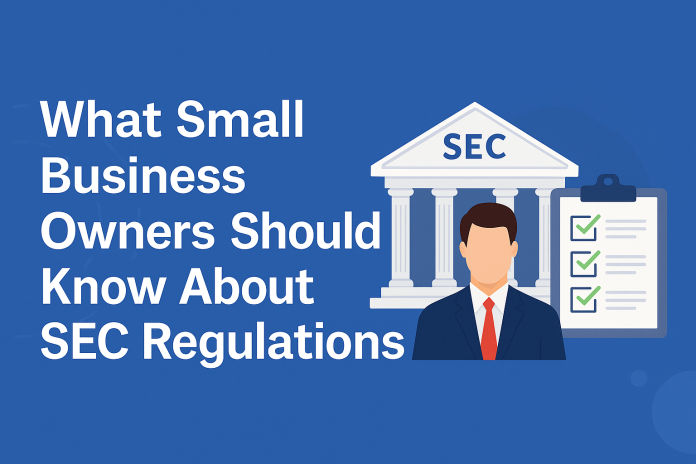For many small business owners in the United States, the SEC (Securities and Exchange Commission) feels like something only big corporations or Wall Street firms deal with. But the truth is, any business that raises money from investors even from family, friends, or online crowdfunding must follow basic SEC rules. Understanding these regulations is much easier than it sounds, and knowing the fundamentals can protect your business from legal trouble and help you grow safely.
Why the SEC Matters to Small Businesses
The SEC’s job is simple: protect investors and keep the market honest. While small companies don’t usually file reports with the SEC, they DO fall under SEC rules once they start offering ownership or investment opportunities. Even if you’re just trying to raise money to expand your shop, launch a new product, or open a second location, the SEC expects transparency and honesty when you accept money in exchange for a future financial return.
This means that running a small business doesn’t require you to be a finance expert but it does require you to understand a few key rules so you don’t break them accidentally.
What Counts as an “Investment” Under SEC Rules?
Many business owners think securities only apply to stocks on the stock exchange, but that’s not true. If someone gives your business money expecting profit, the SEC considers it a security, no matter how small your business is. This includes selling shares, offering ownership stakes, raising money online, forming partnerships with investors, or even taking loans that convert into equity later.
The important takeaway is this: as soon as profit is involved, SEC rules apply.
Raising Money the Legal Way
Small businesses do not need to register with the SEC when raising money instead, they usually rely on exemptions, which are simpler and designed for start-ups and small companies.
The most common and beginner-friendly exemption is Regulation D, which allows businesses to raise money quickly with minimal paperwork, especially from people they already know. Another popular option is Regulation Crowdfunding, which lets you raise money online through platforms like Wefunder or StartEngine. These platforms handle most of the complicated work for you, while still keeping you compliant.
The point of these exemptions is to make fundraising easier, while still ensuring investors receive honest information about the risks and nature of your business.
⚠️ Honesty Is the Most Important Rule
The biggest mistake small business owners can make is misrepresenting their company.
The SEC is extremely strict about misleading statements, such as exaggerating profits, hiding debts, promising guaranteed returns, or presenting unrealistic forecasts.
You don’t need perfect financials you just need to be truthful, provide clear information, and avoid making promises you can’t legally guarantee. Most SEC penalties happen not because a business raises money, but because it does so using misleading claims.
A simple rule to remember:
If you are honest, transparent, and avoid exaggeration, you’re already following one of the SEC’s strongest protections.
Keeping Good Records Protects You
Anytime you take investment money, you should keep basic documentation such as:
-
How much was invested
-
Who invested
-
What they were told about the business
-
How the money is being used
You don’t need complicated systems — even organized digital folders work. Clear records show that you acted responsibly and protected investors’ interests.
Be Careful With Public Advertising
Posting “Looking for investors!” on social media or your website may feel harmless, but it actually counts as public solicitation under SEC rules. This is only allowed under specific exemptions like Rule 506(c) or Regulation Crowdfunding. If you’re raising money under exemptions that prohibit public advertising, a simple public post can technically break SEC rules.
A safer approach is to understand which exemption you are using, and what types of communication it allows. This is why many small businesses choose crowdfunding portals — they handle compliance for you.
Understanding Investors
The SEC divides investors into two categories:
-
Accredited investors: Wealthier individuals who can handle higher risk
-
Non-accredited investors: Everyday people with normal incomes
Some exemptions allow you to take money from anyone, while others restrict fundraising to accredited investors only. Understanding this distinction helps you choose the right path to raise capital legally and safely.
You Don’t Need to File With the SEC — But You Must Follow the Rules
Small businesses are not required to register with the SEC unless they plan to go public someday. But even without registration, businesses must comply with anti-fraud laws and use the correct exemptions.
This means you can raise money legally without heavy paperwork, as long as you:
-
Use one of the approved fundraising exemptions
-
Stay transparent
-
Keep records
-
Avoid misleading statements
Following these steps keeps your business safe and investor-friendly.
When to Ask for Legal Help
Most small business fundraising doesn’t require hiring a lawyer. But if you plan to raise significant money (over $50,000), bring in multiple investors, or publicly advertise the opportunity, speaking to a securities lawyer for an hour can prevent major mistakes and save you stress later.
Think of it like hiring an accountant for taxes not required, but smart.
Final Thought — SEC Rules Are Simpler Than They Seem
Understanding SEC regulations isn’t about mastering legal language; it’s about knowing how to raise money responsibly and honestly. If you avoid exaggerations, choose the right fundraising method, keep records, and respect investor rights, you’re already on the right side of the rules.
Most small businesses never have problems with the SEC because they follow simple honesty and transparency principles. And with today’s tools especially regulated crowdfunding platforms complying with SEC rules has become easier than ever.



